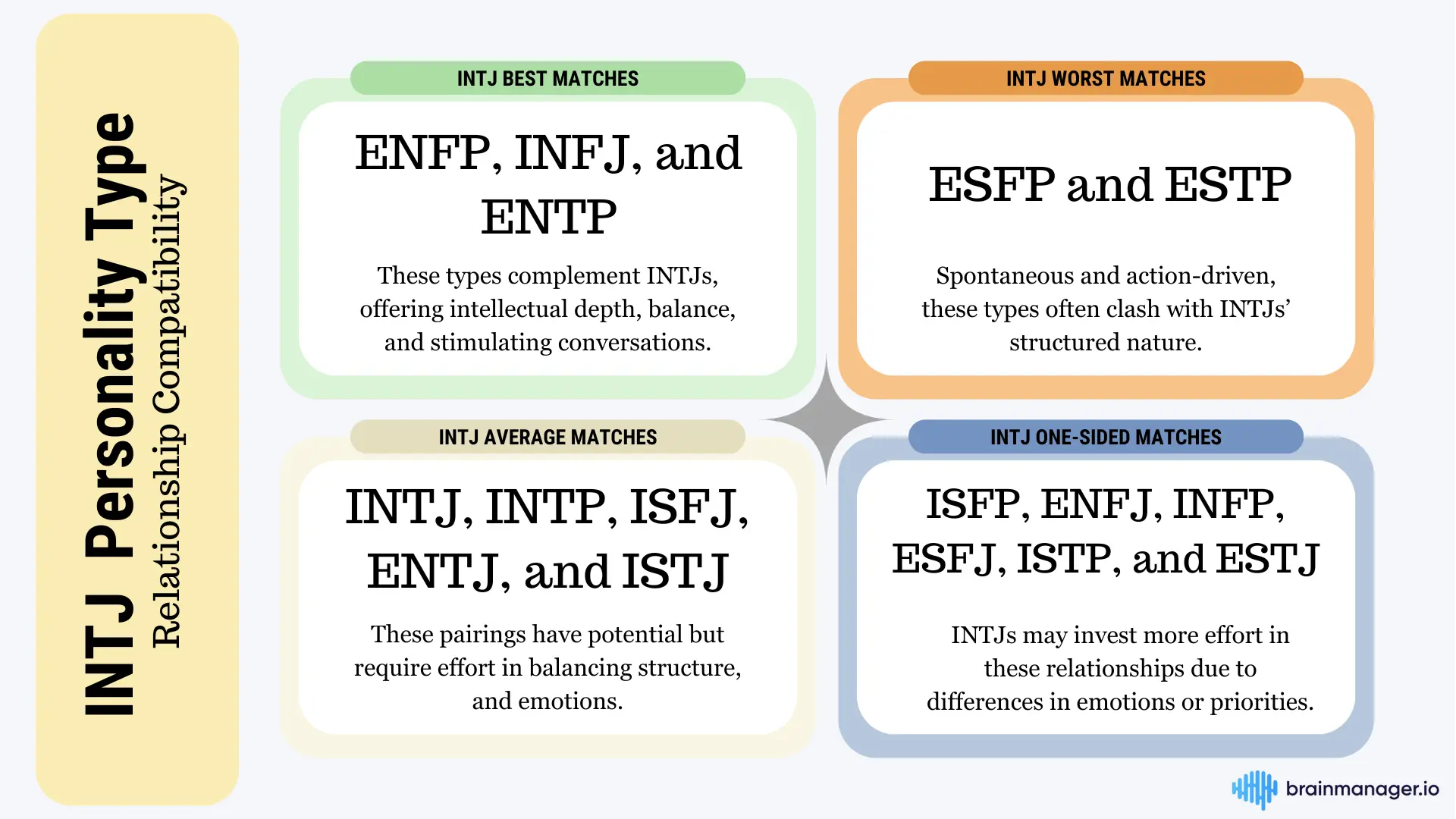INTJ Relationship Guide: Who Fits, Who Fights, and Who Brings Out Their Best
Strategic, independent, and future-focused — INTJs take love as seriously as everything else in life. But not every personality type aligns with their visionary mindset. Discover which MBTI types complement INTJs best, which ones create friction, and how they can build deep, fulfilling relationships based on intellect, trust, and shared goals.


Back
9 mins read
INTJs or “the Architect,” known for their strategic and analytical minds, have a dominant function of Introverted Intuition (Ni), which means they often pair well with Extraverted Intuitive (Ne) types. The best matches for INTJs include ENFPs, INFJs, and ENTPs. ENFPs and ENTPs, with their outgoing and intuitive nature, can complement the INTJ's inward focus and bring balance to the relationship.
On the other hand, INTJs worst matches are ESFPs and ESTPs. These types focus on immediate experiences and sensory details, which can clash with the INTJ's abstract thinking and future-oriented planning, leading to frequent misunderstandings and conflicts.
While MBTI compatibility can significantly help in finding a suitable partner, it's essential to remember that other factors, such as love languages and attachment styles, also play a crucial role in ensuring the success of a relationship. Understanding these aspects can enhance communication, intimacy, and emotional connection, creating a more robust and fulfilling partnership.
INTJ Relationship Compatibility With Other Types

Before I discuss INTJ compatibility with different personality types in detail, here is a detailed compatibility chart illustrating how INTJ matches with different personality types.

While INTJs naturally gravitate toward certain types, every relationship has its strengths and challenges. Let’s take a closer look at how INTJs are in different relationships.
What INTJ is Like in a Relationship
Dating an INTJ can be a profoundly enriching and intellectually stimulating experience. Known for their strategic and analytical minds, INTJs bring a level of thoughtfulness and intentionality to their relationships that can be both rewarding and challenging.
Therefore, when dating an INTJ, you can expect a highly independent partner who values intellectual engagement. They are often more comfortable with deep, meaningful conversations than with casual chit-chat, and they prefer to spend their time in relationships engaging in activities that stimulate their minds.
INTJs are planners and strategists, often thinking several steps ahead, which means they appreciate reliable partners who can engage in thoughtful discussions about the future.
INTJs generally prefer long-term engagements over short-term flings. They seek stability and depth in their relationships, often looking for a partner who shares their vision for the future.
Their approach to relationships is usually serious and committed, with a focus on long-term compatibility and mutual growth. Let's look at the strengths and weaknesses of an INTJ relationship.
Strengths in Relationships
- Intellectual Stimulation: INTJs bring high intellectual engagement to their relationships. They are great at fostering deep, thoughtful discussions and enjoy exploring complex ideas with their partners.
- Loyalty and Commitment: Once committed, INTJs are loyal and dedicated partners. They invest significant effort into maintaining and nurturing their relationships.
- Honesty and Directness: INTJs value honesty and are typically very straightforward in their communication. They appreciate and provide clear, direct communication, which can help prevent misunderstandings.
- Problem-Solving Skills: INTJs are excellent problem solvers and adept at finding efficient solutions to relationship issues. They approach problems logically and work towards resolving conflicts rationally.
Weaknesses in Relationships
- Emotional Detachment: INTJs can sometimes seem emotionally detached or overly analytical. Their preference for logic over emotion can make it difficult for them to connect on a deeper emotional level.
- Difficulty with Expressing Feelings: INTJs may struggle with expressing their emotions openly, leading to misunderstandings or feelings of neglect in their partners.
- Over-Critical Nature: Their critical and perfectionist tendencies can sometimes lead to them being overly critical of their partners or themselves, creating tension in the relationship.
- Need for Independence: INTJs highly value their independence and personal space. This need can sometimes be interpreted as a lack of interest or engagement in the relationship, especially by partners who require more frequent emotional reassurance.
INTJ Compatibility: Who Makes the Best Match?

INTJs, with their analytical minds and strategic thinking, approach relationships with the same level of thoughtfulness and intention that they apply to other areas of life. In exploring compatibility, it's crucial to understand how INTJs interact with different MBTI personality types.
Each pairing can bring unique strengths and challenges influenced by cognitive functions, values, communication styles, and lifestyle preferences. So, let’s take a look at different INTJ matches.
INTJ Best Matches
INTJs are known for their intellectual rigor, strategic thinking, and preference for deep, meaningful connections. When it comes to relationships and what they are looking for, they often find themselves best matched with partners who can complement their strengths and challenge them intellectually.
The best matches for INTJs include ENFPs, INFJs, and ENTPs. These pairings work well due to complementary cognitive functions, shared values, and the ability to balance each other's strengths and weaknesses. They balance intellectual stimulation, emotional depth, and dynamic interaction, creating solid and fulfilling relationships.
INTJ and ENFP Compatibility
ENFPs are enthusiastic, creative, and spontaneous individuals who can breathe fresh air into an INTJ's structured world. The complementary nature of these two types lies in their cognitive functions: INTJs lead with Introverted Intuition (Ni), while ENFPs lead with Extraverted Intuition (Ne).
ENFPs' warmth and expressiveness can help INTJs to open up emotionally, fostering a more intimate and balanced relationship. Additionally, ENFPs' adaptability and spontaneity can introduce variety and excitement into the relationship, balancing the INTJ's structured and systematic approach.
INTJ and INFJ Compatibility
The INFJ and INTJ pairing is often marked by a deep, mutual understanding and shared vision for the future. Both types value depth in their relationships and are driven by their dominant function of Introverted Intuition (Ni), which makes them naturally attuned to each other's thought processes.
This pairing excels in communication, as both partners are inclined toward introspection and thoughtful conversation. They can work together harmoniously towards common goals, appreciating each other's insights and dedication.
INTJ and ENTP Compatibility
ENTPs bring a lively, innovative energy to a relationship with an INTJ. Known for their quick wit and love of debate, ENTPs can intellectually stimulate INTJs, encouraging them to think outside the box and consider different perspectives.
The ENTP's dominant function, Extraverted Intuition (Ne), complements the INTJ's Introverted Intuition (Ni), making for a partnership rich in exploration and new ideas. ENTPs' natural charm and adaptability can also help soften the INTJ's sometimes rigid demeanor, while INTJs' strategic planning can structure the ENTP's spontaneity.
INTJ Average Matches

INTJs often find themselves intrigued by partners who can engage them intellectually and complement their logical and strategic nature. However, while potentially fulfilling, some pairings may require more effort and adjustment to reach their full potential.
These average matches for INTJs include INTPs, INTJs, ISFJs, ENTJs, and ISTJs. These relationships offer a mix of harmony and challenge, but they may only sometimes provide the ideal balance or depth that INTJs seek. Let's explore why these pairings are considered average matches for INTJs.
INTJ and INTP Compatibility
INTPs and INTJs share a common ground in their love for intellectual exploration and logical reasoning. Both types are introverted and intuitive, which can lead to deep and stimulating conversations. However, their differences in approach can create challenges; while INTJs are more structured and decisive, INTPs are more flexible and prefer to keep options open.
This difference can sometimes lead to frustration, as INTJs may seek more closure and direction than INTPs are comfortable providing. Despite these challenges, this pairing can work well if both partners appreciate and respect their differing approaches to problem-solving and decision-making.
INTJ and INTJ Compatibility
A relationship between two INTJs can be marked by a strong understanding and mutual respect for each other's need for independence and intellectual stimulation. However, this pairing may also need help with emotional expression and flexibility, as both partners may prioritize logic over emotion and structure over spontaneity.
While they can build a profoundly intellectual bond, they may need to work on communicating their feelings and adapting to each other's needs for variety and spontaneity. This pairing works best when partners are willing to step outside their comfort zones and prioritize emotional connection and intellectual rapport.
INTJ and ISFJ Compatibility
ISFJs bring a nurturing and supportive presence to a relationship, offering stability and focusing on practical matters. This can complement the INTJ's visionary and strategic nature, providing a grounded perspective. However, the differences in cognitive functions can lead to misunderstandings.
ISFJs are detail-oriented and sensitive to the needs of others, while INTJs may need to pay more attention to these nuances in favor of the bigger picture. To make this pairing work, both partners must appreciate their differences and communicate their needs and expectations openly.
INTJ and ENTJ Compatibility
ENTJs and INTJs share a similar focus on efficiency, planning, and achieving goals. Both types are driven and ambitious, making them potentially powerful partners in pursuing shared objectives. However, their similarities can lead to power struggles, as both types are naturally inclined to take charge.
ENTJs' extraversion may sometimes overwhelm the INTJ's preference for quiet and introspection, while INTJs' need for independence may clash with ENTJs' desire for active engagement. Successful relationships between these types often hinge on balancing cooperation and autonomy.
INTJ and ISTJ Compatibility
ISTJs and INTJs can find common ground in their shared introversion, logical approach, and preference for structure. However, ISTJs' focus on tradition and practicality may sometimes conflict with INTJs' forward-thinking and innovative nature.
While ISTJs value stability and routine, INTJs are more inclined to explore new possibilities and challenge the status quo. This pairing can work well if both partners are willing to respect and learn from each other's differing perspectives and strengths, blending the ISTJ's reliability with the INTJ's vision.
INTJ One-sided Matches

In relationships, compatibility often hinges on the ability of partners to complement each other's strengths and bridge their differences. For INTJs, specific pairings can lead to one-sided dynamics where one partner does more emotional or practical heavy lifting.
These one-sided matches include ISFP, ENFJ, INFP, ESFJ, ISTP, and ESTJ. While these pairings can work, they require significant effort from both partners to understand and accommodate each other's needs, ensuring that both feel supported.
INTJ and ISFP Compatibility
In a relationship with an ISFP, INTJs often find themselves taking on the role of providing structure and long-term planning. ISFPs are spontaneous and live in the moment, which can clash with the INTJ's need for planning and foresight.
While ISFPs offer creativity and emotional sensitivity, they may need help with the INTJ's focus on future goals and systematic approaches. This can lead to frustration, as ISFPs might feel constrained by the INTJ's need for structure, while INTJs may feel burdened by constantly anchoring the relationship.
INTJ and ENFJ Compatibility
ENFJs are warm, empathetic, and focused on the emotional well-being of their relationships. They often seek deep emotional connections and frequent communication. However, INTJs, with their rational and analytical approach, may struggle to meet these emotional needs.
While INTJs can offer logical analysis and strategic planning, they might find it challenging to provide the emotional support ENFJs crave. This can lead to a dynamic where the ENFJ feels emotionally neglected while the INTJ feels overwhelmed by the need for constant emotional engagement.
INTJ and INFP Compatibility
INTJs often find themselves providing direction and structure in a relationship with an INFP. While INFPs are idealistic and flexible, their lack of decisiveness can frustrate the more goal-oriented and decisive INTJ.
INFPs value personal harmony and may avoid conflicts, while INTJs prefer direct communication and problem-solving. This dynamic can become one-sided, with the INTJ taking on the responsibility of making decisions and driving the relationship forward, potentially leading to resentment from both sides if not managed carefully.
INTJ and ESFJ Compatibility
ESFJs are highly social and focused on the needs and emotions of others, which can sometimes conflict with the INTJ's goal-oriented and strategic nature. In this pairing, INTJs often find themselves providing strategic planning and logical analysis, while ESFJs focus on maintaining harmony and social connections.
The main conflict arises from ESFJs' emphasis on emotional support and people-centric approaches, which INTJs may undervalue. This can lead to feelings of neglect for the ESFJ, while the INTJ may feel pressured to engage in social activities they find draining.
INTJ and ISTP Compatibility
In relationships with ISTPs, INTJs often take on the role of planning and providing vision. ISTPs are action-oriented and prefer to live in the moment, which can clash with the INTJ's strategic and long-term thinking.
This dynamic can become one-sided as INTJs may feel responsible for guiding the relationship's direction, while ISTPs may resist the perceived imposition of structure. The contrast between ISTPs' focus on practical, immediate experiences and INTJs' abstract, future-oriented thinking can create friction and misunderstandings.
INTJ and ESTJ Compatibility
INTJs and ESTJs can have a productive dynamic, but they may become one-sided due to their differing focuses. While both types value efficiency and effectiveness, ESTJs are more focused on immediate, practical outcomes, whereas INTJs are driven by strategic vision and long-term goals.
This can lead to conflicts where ESTJs prioritize efficiency and practicalities, and INTJs feel constrained or undervalued for their visionary contributions. The dynamic may feel one-sided as INTJs constantly explain and justify their abstract plans, while ESTJs might focus on tangible, immediate results.
INTJ Worst Matches

In the realm of personality compatibility, some pairings present more significant challenges than others due to fundamental differences in values, communication styles, and cognitive functions. For INTJs, the worst matches are often with ESFPs and ESTPs.
These personality types, characterized by their dominant Extraverted Sensing (Se) function, often find themselves at odds with the INTJ's dominant Introverted Intuition (Ni). The result is a relationship dynamic that can be fraught with misunderstandings and frustrations.
INTJ and ESFP Compatibility
ESFPs are known for their vivacity, spontaneity, and a strong preference for living in the moment. They are highly social, enjoy new experiences, and often make decisions based on immediate sensory input. This starkly contrasts with the INTJ's future-oriented, strategic thinking and preference for planning.
INTJs are focused on long-term goals and abstract concepts, often finding it challenging to relate to the ESFP's more hedonistic and present-focused lifestyle. The ESFP's need for constant stimulation and social interaction can overwhelm the INTJ, who values quiet reflection and depth in conversation, making this pairing particularly challenging.
INTJ and ESTP Compatibility
ESTPs share a similar dynamic with INTJs as ESFPs but with an added emphasis on logic and practical problem-solving. While ESTPs are adept at responding to immediate needs and challenges with quick, effective solutions, they often prioritize action over introspection. The ESTP's love for risk-taking and adventure can be unsettling for the more risk-averse and cautious INTJ.
In this pairing, the INTJ may find themselves constantly having to justify their more deliberate, visionary approaches. At the same time, ESTPs may feel constrained by what they perceive as the INTJ's overly theoretical or cautious nature.
Final Words on INTJ Compatibility

In the end, INTJs approach relationships much like they do everything else — with precision, intentionality, and a vision for the future. While compatibility charts and personality theories offer valuable insights, no relationship is purely defined by MBTI types alone.
Growth happens when both partners learn to bridge differences, embrace challenges, and appreciate each other's strengths.
Whether an INTJ finds harmony with a like-minded strategist or excitement with a spontaneous free spirit, the most fulfilling connections are built on mutual respect, shared goals, and the willingness to evolve together. After all, love isn’t just about perfect alignment — it’s about creating something meaningful in the spaces between.


Return to Blog




